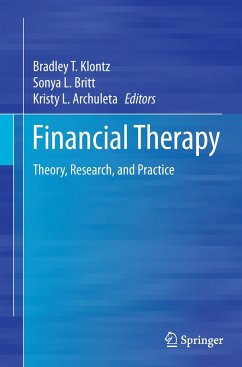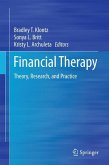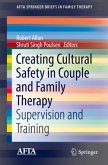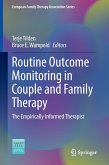Money-related stress dates as far back as concepts of money itself. Formerly it may have waxed and waned in tune with the economy, but today more individuals are experiencing financial mental anguish and self-destructive behavior regardless of bull or bear markets, recessions or boom periods. From a fringe area of psychology, financial therapy has emerged to meet increasingly salient concerns.
Financial Therapy is the first full-length guide to the field, bridging theory, practical methods, and a growing cross-disciplinary evidence base to create a framework for improving this crucial aspect of clients' lives. Its contributors identify money-based disorders such as compulsive buying, financial hoarding, and workaholism, and analyze typical early experiences and the resulting mental constructs ("money scripts") that drive toxic relationships with money. Clearly relating financial stability to larger therapeutic goals, therapists from varied perspectives offer practical tools for assessment and intervention, advise on cultural and ethical considerations, and provide instructive case studies. A diverse palette of research-based and practice-based models meets monetary mental health issues with well-known treatment approaches, among them:
Cognitive-behavioral and solution-focused therapies.Collaborative relationship models.Experiential approaches.Psychodynamic financial therapy.Feminist and humanistic approaches.Stages of change and motivational interviewing in financial therapy.
A text that serves to introduce and define the field as well as plan for its future, Financial Therapy is an important investment for professionals in psychotherapy and counseling, family therapy, financial planning, and social policy.
Financial Therapy is the first full-length guide to the field, bridging theory, practical methods, and a growing cross-disciplinary evidence base to create a framework for improving this crucial aspect of clients' lives. Its contributors identify money-based disorders such as compulsive buying, financial hoarding, and workaholism, and analyze typical early experiences and the resulting mental constructs ("money scripts") that drive toxic relationships with money. Clearly relating financial stability to larger therapeutic goals, therapists from varied perspectives offer practical tools for assessment and intervention, advise on cultural and ethical considerations, and provide instructive case studies. A diverse palette of research-based and practice-based models meets monetary mental health issues with well-known treatment approaches, among them:
Cognitive-behavioral and solution-focused therapies.Collaborative relationship models.Experiential approaches.Psychodynamic financial therapy.Feminist and humanistic approaches.Stages of change and motivational interviewing in financial therapy.
A text that serves to introduce and define the field as well as plan for its future, Financial Therapy is an important investment for professionals in psychotherapy and counseling, family therapy, financial planning, and social policy.
"The book is an excellent overview of the current theories, research, and practice models in financial therapy. ... the book provides financial and behavioral insights into money issues and a better understanding of the intra and inter-relational aspects of money in people's lives." (Lucy M. Delgadillo, PsycCRITIQUES, Vol. 60 (26), June, 2015)
This compilation of research, methods, practices and deep well of knowledge is for those involved in or interested in financial therapy, required reading. Not only does it offer varying points of view, it offers a very wide array of models that financial professionals need to know exist and where their applicability might lie for the benefits of our clients. The Editors of this immense work, Brad Klontz, Psy.D, CFP®, Sonya Britt, Ph.D., CFP® and Kristy Archuleta, Ph.D. LMFT, are top professionals and pioneers in the field of financial therapy and have accumulated works by a variety of professionals from different disciplines to help the reader grasp the reasons for, and applicability, of financial therapy. Through this incredible work, the field, in its infancy, has taken a giant leap forward for the betterment of planners, therapists and most importantly, for the people we serve. - Michael F. Kay, CFP®
President, Financial Life Focus, LLC
This book successfully fills a resource gap within financial therapy by providing a thorough and in-depth overview of theories and models relevant to addressing money beyond the numbers. This foundational book holds significance in the development of a young and emerging field and is a must read for those interested in financial therapy practice, research, and education. - Sarah D. Asebedo, M.S., CFP®
This book is an excellent introduction to the concept of financial therapy and the theories applicable to this new field. Whether a student is majoring in finance or therapy, this book gives an easily understood overview of the intersection between the two disciplines and provides intriguing possibilities for combining the two. - Marcee Yager, Todos Santos, BCS, Mexico
This compilation of research, methods, practices and deep well of knowledge is for those involved in or interested in financial therapy, required reading. Not only does it offer varying points of view, it offers a very wide array of models that financial professionals need to know exist and where their applicability might lie for the benefits of our clients. The Editors of this immense work, Brad Klontz, Psy.D, CFP®, Sonya Britt, Ph.D., CFP® and Kristy Archuleta, Ph.D. LMFT, are top professionals and pioneers in the field of financial therapy and have accumulated works by a variety of professionals from different disciplines to help the reader grasp the reasons for, and applicability, of financial therapy. Through this incredible work, the field, in its infancy, has taken a giant leap forward for the betterment of planners, therapists and most importantly, for the people we serve. - Michael F. Kay, CFP®
President, Financial Life Focus, LLC
This book successfully fills a resource gap within financial therapy by providing a thorough and in-depth overview of theories and models relevant to addressing money beyond the numbers. This foundational book holds significance in the development of a young and emerging field and is a must read for those interested in financial therapy practice, research, and education. - Sarah D. Asebedo, M.S., CFP®
This book is an excellent introduction to the concept of financial therapy and the theories applicable to this new field. Whether a student is majoring in finance or therapy, this book gives an easily understood overview of the intersection between the two disciplines and provides intriguing possibilities for combining the two. - Marcee Yager, Todos Santos, BCS, Mexico








